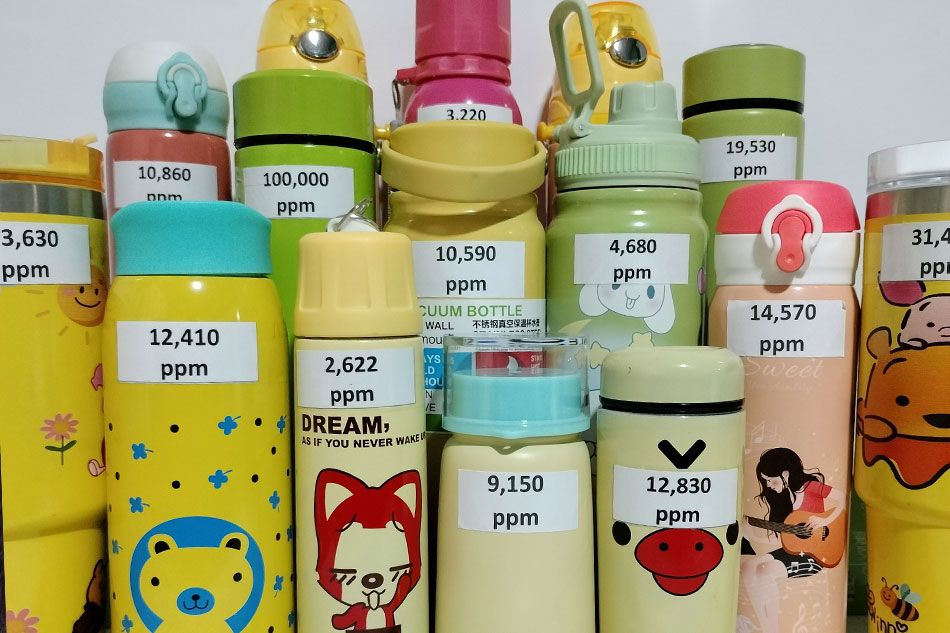High levels of toxic lead found in some reusable water bottles | ABS-CBN

Welcome, Kapamilya! We use cookies to improve your browsing experience. Continuing to use this site means you agree to our use of cookies. Tell me more!
High levels of toxic lead found in some reusable water bottles
High levels of toxic lead found in some reusable water bottles
 High levels of toxic lead were found in some reusable water bottles. Photo from Ecowaste Coalition
High levels of toxic lead were found in some reusable water bottles. Photo from Ecowaste Coalition
 High levels of toxic lead were found in some reusable water bottles. Photo from Ecowaste Coalition
High levels of toxic lead were found in some reusable water bottles. Photo from Ecowaste CoalitionMANILA — Advocacy group Ecowaste Coalition has found "dangerously high" levels of potentially toxic lead-containing paints in several reusable water bottles and tumblers bought online and in select retail stores in Metro Manila and neighboring areas.
MANILA — Advocacy group Ecowaste Coalition has found "dangerously high" levels of potentially toxic lead-containing paints in several reusable water bottles and tumblers bought online and in select retail stores in Metro Manila and neighboring areas.
Ecowaste said in a release Tuesday that it purchased sample reusable water bottles from online sellers and physical shops in Caloocan City, City of Manila, Quezon City, Antipolo City, and Teresa in Rizal between July to October 2024.
Ecowaste said in a release Tuesday that it purchased sample reusable water bottles from online sellers and physical shops in Caloocan City, City of Manila, Quezon City, Antipolo City, and Teresa in Rizal between July to October 2024.
They were sold at P145 to P289 each.
They were sold at P145 to P289 each.
Ecowaste said 15 of the reusable steel water bottles it bought had lead above the 90 parts per million (ppm) limit set by the government on their exterior coatings.
Ecowaste said 15 of the reusable steel water bottles it bought had lead above the 90 parts per million (ppm) limit set by the government on their exterior coatings.
ADVERTISEMENT
Ten water bottles contained "dangerously high" levels of lead above 10,000 ppm, and one of them had over 100,000 ppm lead, it said.
Ten water bottles contained "dangerously high" levels of lead above 10,000 ppm, and one of them had over 100,000 ppm lead, it said.
Meanwhile, lead was not detected in the other 15 samples. Ecowaste said this means water bottles and tumblers could be decorated with paints that would not result in lead exposure.
Meanwhile, lead was not detected in the other 15 samples. Ecowaste said this means water bottles and tumblers could be decorated with paints that would not result in lead exposure.
'VERY DISTURBING'
Ecowaste noted that some of the products analyzed were decorated with cartoon characters, indicating that they were marketed for children's use.
Ecowaste noted that some of the products analyzed were decorated with cartoon characters, indicating that they were marketed for children's use.
None of the products had lead hazard warnings.
None of the products had lead hazard warnings.
The presence of lead on the coatings of the reusable water bottles is "very disturbing," Ecowaste said, noting that the paint could deteriorate with repeated use and could be swallowed by children who are unaware of its health risks.
The presence of lead on the coatings of the reusable water bottles is "very disturbing," Ecowaste said, noting that the paint could deteriorate with repeated use and could be swallowed by children who are unaware of its health risks.
ADVERTISEMENT
"Lead is toxic if ingested and can cause adverse health problems," the group said, adding that according to the United Nations Children's Fund (UNICEF), lead is "responsible for nearly 1.5 percent of annual global deaths – almost as many deaths as from HIV and AIDS, and more than from malaria."
"Lead is toxic if ingested and can cause adverse health problems," the group said, adding that according to the United Nations Children's Fund (UNICEF), lead is "responsible for nearly 1.5 percent of annual global deaths – almost as many deaths as from HIV and AIDS, and more than from malaria."
"Lead affects a child's developing brain, causing decreased intelligence, behavioral disorders, and learning problems which can reduce potential earnings in adulthood. It also affects almost every organ in a child’s body, including the heart, lungs and kidneys," UNICEF said.
"Lead affects a child's developing brain, causing decreased intelligence, behavioral disorders, and learning problems which can reduce potential earnings in adulthood. It also affects almost every organ in a child’s body, including the heart, lungs and kidneys," UNICEF said.
ECOWASTE URGES FIRMS TO COMPLY WITH LEAD STANDARDS
Ecowaste also called on the authorities to enforce the country's lead paint standards in reusable water bottles and tumblers being sold in the market.
Ecowaste also called on the authorities to enforce the country's lead paint standards in reusable water bottles and tumblers being sold in the market.
The group urged the government to identify the regulatory agency tasked to implement the said standards and remove non-compliant products from the market, including those from online shopping sites.
The group urged the government to identify the regulatory agency tasked to implement the said standards and remove non-compliant products from the market, including those from online shopping sites.
"While reusable stainless steel water bottles are helpful in decreasing the consumption of single-use plastic water bottles, their manufacturers must comply with the country’s lead paint standard and other applicable standards," Ecowaste said.
"To assist consumers in choosing water bottles that pose no lead hazard, the group called on manufacturers to duly mark their products as 'lead-free' or 'lead-safe' as confirmed through third-party certification and to provide basic product labeling information on the packaging, especially the manufacturer’s and/or distributor’s name and contact details."
ADVERTISEMENT
ADVERTISEMENT

